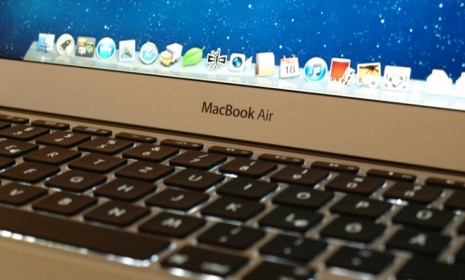How Orbitz hides bargains from Mac users: Will other companies follow suit?
The travel-booking site is baiting Mac users with more expensive deals, foreshadowing a possible trend of companies targeting the wealthier 'Apple demographic'

A free daily email with the biggest news stories of the day – and the best features from TheWeek.com
You are now subscribed
Your newsletter sign-up was successful
If you assumed that travel-booking site Orbitz works the same for Mac and PC users, you were wrong, says Dana Mattioli at The Wall Street Journal. Orbitz has figured out that Mac users are likely to pay 30 percent more per night on hotels than their PC counterparts, and has subsequently rejiggered its search algorithm so that Mac users see more expensive deals. Orbitz probably won't be the last company to use such a tactic, which is part of a growing trend in "predictive analytics," in which online retailers crunch "reams of data to guess the future shopping habits of customers." Here, a guide to predictive analytics and Orbitz's targeting of Mac users:
Do Mac users really spend that much more?
Yes, on average anyway. "The average household income for adult owners of Mac computers is $98,560," says Mattiolo, "compared with $74,452 for a PC owner." Plus, owners of iPads place bigger online orders than laptop or desktop computer users, while iPhone shoppers spend more heavily than those who use Android-operated phones or BlackBerries. Such data has given rise to what marketers are calling an "Apple demographic."
The Week
Escape your echo chamber. Get the facts behind the news, plus analysis from multiple perspectives.

Sign up for The Week's Free Newsletters
From our morning news briefing to a weekly Good News Newsletter, get the best of The Week delivered directly to your inbox.
From our morning news briefing to a weekly Good News Newsletter, get the best of The Week delivered directly to your inbox.
How does Orbitz target Mac users?
"Pricier and often more luxurious offers are displayed more prominently" in hotel searches made from a Mac, says Molly Oswaks at Gizmodo. Mac users can choose to rearrange the search by price, and there is no price difference for the same hotel room. Still, the bottom line is that if you're a Mac user, Orbitz isn't going out of its way to show you the best deals, says Adrian Kingsley-Hughes at Forbes.
How have customers reacted?
Some say they're fine with it as long as they can rearrange the search by price. Others are less sanguine. "This practice seems pretty creepy and annoying," says Shaylin Clark at WebProNews. "After all, why should Orbitz assume I'm willing to spend more money on a hotel just because I have a Mac? How do they know I'm not a broke college student who got the Mac as a gift?"
A free daily email with the biggest news stories of the day – and the best features from TheWeek.com
Will other companies follow suit?
Probably. Google and Facebook already track your behavior to offer you targeted ads, says Jake Smith at 9To5Mac. And it seems as though it's only a matter of time before Orbitz's competitors start "checking who is browsing with which operating system." Indeed, many companies are already scrambling "to identify new ways in which people's browsing data can be used to boost online sales," says Mattioli.
Sources: 9To5Mac, Forbes, Gizmodo, The Wall Street Journal, WebProNews
-
 One great cookbook: Joshua McFadden’s ‘Six Seasons of Pasta’
One great cookbook: Joshua McFadden’s ‘Six Seasons of Pasta’the week recommends The pasta you know and love. But ever so much better.
-
 Scientists are worried about amoebas
Scientists are worried about amoebasUnder the radar Small and very mighty
-
 Buddhist monks’ US walk for peace
Buddhist monks’ US walk for peaceUnder the Radar Crowds have turned out on the roads from California to Washington and ‘millions are finding hope in their journey’